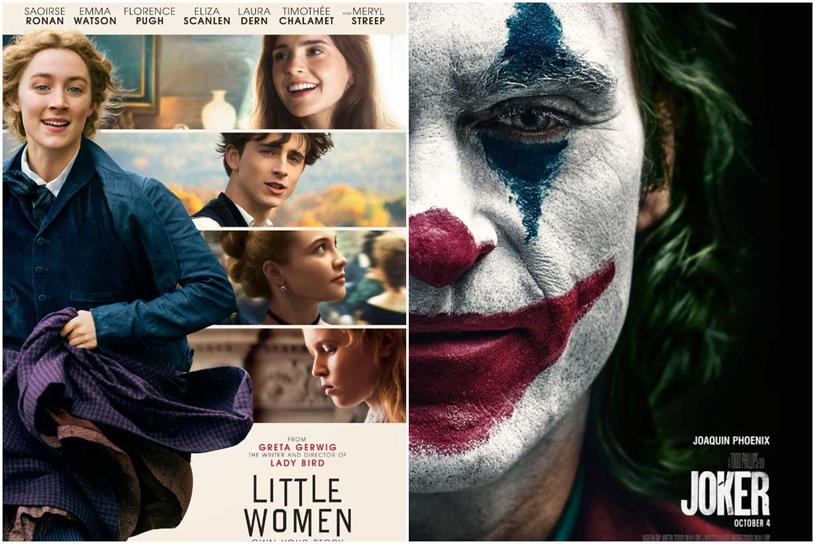The biggest night in Hollywood takes place on Sunday (9 February), when the 92nd Academy Awards honour the best films and talent of the year. Sam Mendes’ World War I drama 1917, Joaquin Phoenix, Renée Zellweger and Korean film Parasite are among those tipped to win big.
Ahead of the Oscars, creative leaders pick their favourite nominated films and share what they teach us about creativity.
1917’s one-shot technique shows single-minded commitment
By Aporva Baxi, co-founder and executive creative director, DixonBaxi
1917’s story is simple: a delivery of a message against all odds. But it’s the single-minded commitment to the single shot that makes this work so well. Committing to the idea from the cover of the script, getting everyone on board and going further to make it happen with a laser focus makes great work and, in this case, a great film. From plotting out sets to be the exact length of a scene to defining every shot and how the camera moves, it’s a testament to planning, collaboration and that practice can make perfect.
Even with everything worked out to be exact and precise, the framework still allows for wonderful, spontaneous moments that feel like they could never be written, only captured. The audience may never know it was not on the page of the script, but they can feel it. Letting go and letting it happen is a skill in itself.
It’s impossible not to admire the hard graft and passionate commitment to the technique behind the film. Even so, the craft – and specifically the sublime cinematography by the legendary Roger Deakins – captures the beauty, sadness, horror, humanity and bravery in equal measure, bringing us closer to the story and power of it.
People thought the single-shot idea was a typo on the cover of the script or a gimmick to get the film made. What is proven, though, is the creativity that drives everyone involved to reach for something seen as impossible and unattainable. Creativity at its best does that and resets what is possible. 1917 is an immersive, unforgettable reminder of what it means to be creatively brave.
Little Women is a real and complex representation of women
By Kathryn Jacob, chief executive, Pearl & Dean
It’s great to see that Hollywood is embracing what real inclusivity and representation look like. Last year, the box office was hit with a plethora of films packed with progressive representation, including Us, The Favourite, Green Book and If Beale Street Could Talk; and this year we’ve seen Little Women.
Of course, representation needs to go beyond merely someone being on the screen – we need interesting, complex roles that show real people and obliterate the Bechdel test. Greta Gerwig’s remake of the classic Little Women gives us this in spades. The richness in production, gorgeous visuals, painstaking attention to detail and sweeping cinematography are easily matched by the richness of the themes her characters grapple with: the contrast between the idealism of childhood and the compromises we all inevitably have to make as adults; the fight between head and heart; how growing up is ultimately a loss.
With the Oscars almost upon us, it’s time to remind ourselves that people are beginning to vote with their wallets and demand diversity – and, ultimately, the advertising that runs alongside amazing cinema that challenges perceptions should be just as challenging and boundary-pushing. The Academy gained notoriety for being seen as male, pale and stale. We should celebrate advertising like Starbucks’ "What’s your name", showing the life-changing moment when transgender and gender-diverse people use their new name in public. Let’s commit to moving on from the same old stories and use our power to represent the world in all its beautiful variety.
Joker is a masterclass in casting
By Laurent Simon, chief creative officer, VMLY&R
I have a three-year-old daughter, so a cinema trip is a rarity these days.
So when I was asked to pick a film nominated for the Oscars, I couldn’t help but laugh to myself. It’s like asking an underaged kid which car he/she likes to drive best.
I wish I’d seen Parasite but, instead, the only film I saw at the cinema last year was Joker. And I walked out halfway through.
Not because I thought it was awful, but because it made me feel viscerally awful.
I remember going home asking my little girl to watch Peter Rabbit with me.
Joaquin Phoenix’s performance was just a class act. Raw. Real. Irremediably doomed.
Coupled with the fact that the cinematography is akin to the best documentaries, I was fully immersed in Todd Phillips’ satire of our society: how we breed, feed, ignore and oppress mental health.
I can only salute them both: Phoenix, for filling Heath Ledger’s clown shoes hands down with an instant pop classic; and Phillips, for deciding to choose him.
And it is this precise skill I’d like to touch on: casting.
Getting the casting spot on is probably one of the most important calls you can make as a creative leader.
You need to cast your department right, so their individual strengths and abilities complement each other for the benefit of the team. I see very little point in running a floor that would consist of 11 strikers.
But also casting the right talent for the right brief – from creatives to production, design, illustration, photography, tech, innovation, comms or PR partners.
Get this right and you’re laughing.
Bombshell and Jojo Rabbit tell old stories in new ways
By Jo Arden, chief strategy officer, MullenLowe London
With the debate about diversity (or rather equality – thank you, Mr Phoenix) at the Baftas still raging, looking at a film that tackles that issue seems right. Bombshell is a carefully crafted and captivating story of the systemic sexual harassment and abuse that existed at Fox News. There are some powerful lessons about creativity here: the well-judged lack of gratuitous sex reminds us that there’s as much power in what we don’t show as in what we do; that the truth is there to be heard if we have the imagination to listen to those whose voices are less loud; that it is in our gift to amplify them; and that stories are worth a thousand stats, even when the stats are totally horrifying.
Bombshell was not the only film this year which told an old story in a new way. Jojo Rabbit, too, gave us a new perspective on a history we collectively carry. In both cases, uncomfortable topics reached new audiences by entertaining and by being beautifully written, well-crafted in every department and obviously well-acted. It’s a reminder about what is true in our industry too – that to land a message well, we must wrap it in language people will be intrigued to hear.
Once Upon a Time in Hollywood teaches us to embrace change
By Russell Schaller, executive creative director, Cheil UK
Creative folk live in constant fear of being outthought, outwitted, outsmarted – but, worst of all, I think, outdated.
Actor Rick Dalton (Leonardo DiCaprio) in Once Upon a Time in Hollywood, Tarantino’s most "Tarantino" of movies, understands this only too well.
Like Rick and his sidekick stuntman Cliff Booth (Brad Pitt), we work in an industry that thrives on young blood. Freshly sprinkled cultural relevance is where the magic lies. How we package new ideas is the only thing that makes them new.
The film, set in 1960s Hollywood, is as much about Dalton’s realisation that, unlike him, Hollywood has moved on as it is about the Manson family crimes. Instead of adapting to the changes and reinventing himself, he seems intent on wallowing in self-pity and bourbon. Ironically, it takes a kid to rescue him from his childlike stupor.
The film teaches us to move on, to embrace change and the younger generation. And so must we. Yes, data analysis has swooped in to steal the show, new platforms keep popping up and down, trends get turbocharged and esports stars earn more than movie stars. But for the younger generation, this is just the norm. It’s only when we nurture and collaborate cleverly with our young, talented creatives that the fear of being outdated becomes a thing of the past.








